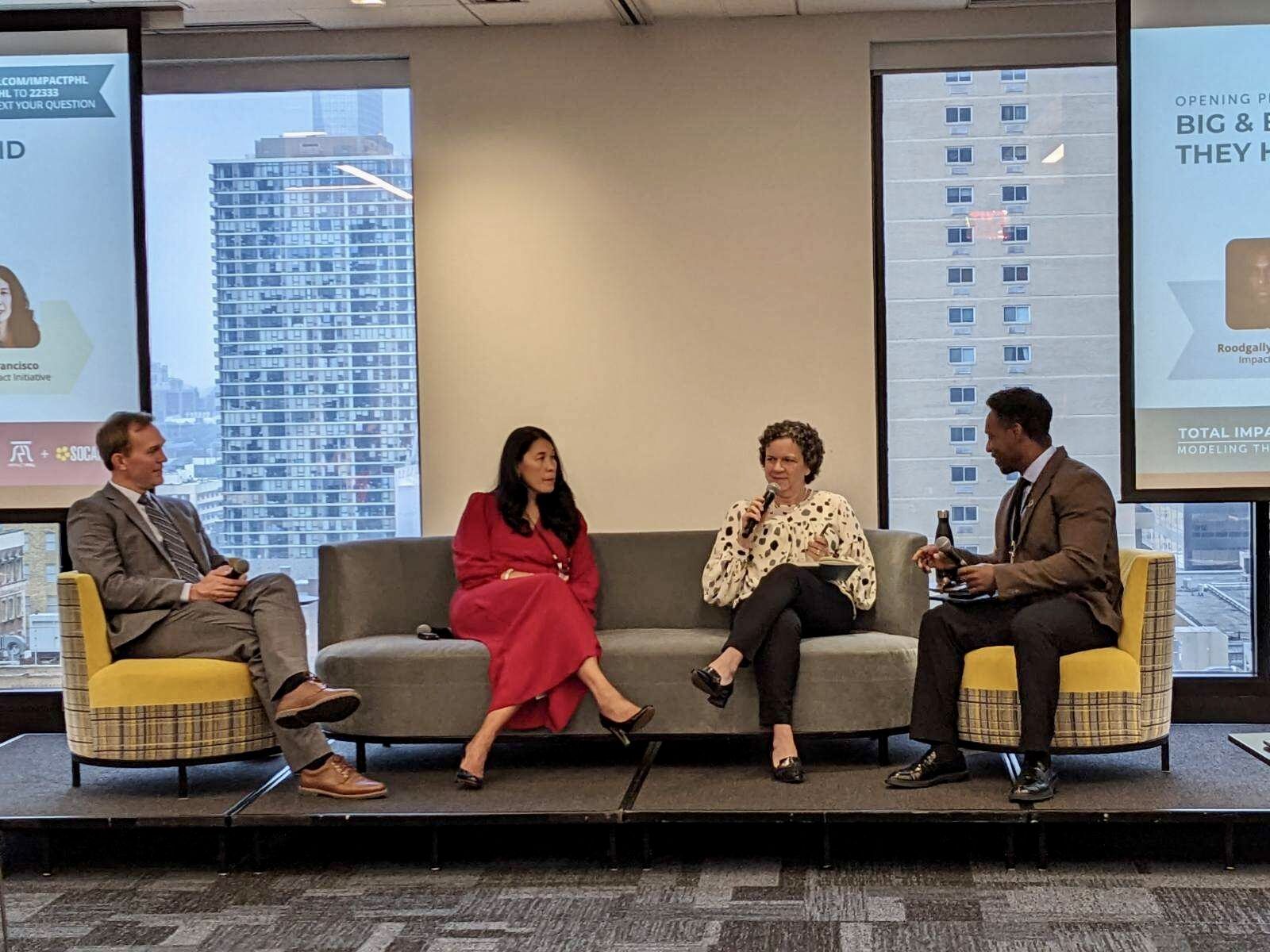TGIF, Agents of Impact!
See you at the Impact Block Party. Connect with other Agents of Impact and ImpactAlpha editor David Bank to talk blockchain for impact investors at the Milken Institute Global Conference in Beverly Hills. Kano.vc, in collaboration with ImpactAlpha, is hosting a pop-up salon, Tuesday, April 30, from 5:30-7:00 pm. RSVP today.
Featured: The Brief’s Big 9
1. Corporations are getting paid for sustainability with lower-cost capital. Banks are increasingly tying interest-rate reductions on corporate loans to improvements in sustainability performance. Such sustainability-linked loans let “banks engage with their clients on what the main risks are and how they go about mitigating those,” said Anne van Riel of the Dutch bank ING. The incentives effectively pay companies for boosting resource efficiency, mitigating climate risks or improving relations with local communities. The market for sustainability-linked loans totaled $36 billion last year; the roster of borrowers included U.K. residential developer London & Quadrant and Singapore-based food company Olam. Real estate firm Prologis signed a $3.5 billion line of credit linked to the number of green warehouses it constructs. “We think this is the next important wave in all this green financing,” Prologis’ Tim Arndt told ImpactAlpha. Check it out.
- Throwback Friday. “The Impact Delta: Change is good for investors focused on environmental and social performance”
2. Beyond Meat and the new world order of food. Beyond Meat’s IPO next week will test consumers’ appetite for “vegan” meat – and investors’ appetite for alt-protein and sustainable food stocks. Plant-based meats are only one opportunity for innovation in the $7.8 trillion global food industry. Venture capital investment in the food and agriculture startups was up 40% last year to $17 billion. “We’ve got a total disruption happening across the value chain in food and agriculture,” says Walter Robb, the former co-CEO of Whole Foods who became a sustainable food investor in 2017. There’s “more opportunity than I’ve ever seen in my lifetime,” Robb told ImpactAlpha’s Dennis Price in an on-stage interview. Whet your appetite.
- Watch the interview. Walter Robb spoke with Dennis Price at the Social Innovation Initiative at McCombs Business School at the University of Texas in Austin.
3. Agent of Impact: Serena Williams, athlete, entrepreneur and investor. The 23-time Grand Slam champion and four-time Olympic gold medalist has shined in the spotlight. Now the 37-year-old tennis champ and entrepreneur is using her capital and connections to highlight startup founders that “embrace diverse leadership, individual empowerment, creativity and opportunity.” Through Serena Ventures, Williams has backed more than 30 diverse-led and mission-driven startups. Williams recently invested in Bumble’s new fund to invest in women founders of color. “I found out that women get less than 2% of funds raised by venture capitalists,” Williams told AdWeek, and women of color get a small fraction of that. The Compton-born Williams is among a growing number of high-profile athletes, artists and celebrities using their wealth to invest in the people, places and issues they care about. “What is important to me is to be at the forefront of the change,” says Williams, “and to make it easier for the next person that comes behind me.” Follow ImpactAlpha on Instagram.
- Impact, anyone? “Serena Williams’ portfolio of diverse and impactful startups.”
- Follow the talent with ImpactAlpha’s weekly report on career moves, job openings, events and opportunities.
4. Late-breaking: BRAC Uganda Bank launches with three equity partners. The Bangladesh-based NGO completed the transition of its lending-only microfinance institution into a deposit-taking bank in order to expand its services in Uganda’s rural areas. “Poor rural women, who are our primary customers, really want savings and deposits,” BRAC’s Shameran Abed told ImpactAlpha. “Sometimes the people they’re saving from are the male members of their families.” With 163 branches and 220,000 borrowers, BRAC had become one of the largest microfinance institutions in Uganda with about $50 million in outstanding loans. The transition took three years and required BRAC to divest majority control. DEG, the German development finance institution, Chicago-based Equator Capital Partners and Amsterdam-based Triple Jump each took 17% stakes. Enclude Capital Advisory, now owned by Palladium, ran the auction and structured the deal, a first for BRAC. Other microfinance institutions that have converted to banks have generally moved up-market; Abed said BRAC aims to continue making $50 loans to poor women in remote areas. “If we can pull it off, that will be quite new,” he said. Next up for conversion: BRAC’s microfinance institution in Tanzania. Share this deal.
5. Deals of the week. Stay on top of the dealflow all week long on ImpactAlpha.com. Some deals that stood out:
- New schooled. Early learning fund LearnStart receives $4 million in anchor capital… GoATL fund backs LIIF’s charter school finance program in Atlanta.
- Growth markets. PadSplit raises $4.6 million to match tenants with affordable housing… ZestMoney secures $20 million to lend to Indian customers with no borrowing history… Tencent backs another Latin American neo-bank, taking a stake in Ualá.
- Returns on inclusion. Bridging Finance launches fund to finance indigenous development projects in Canada.
- Food and farmer finance. Sustainable tilapia farm in Zambia secures $10.5 million loan… Dutch bio-product company Ceradis secures €9 million from impact investors.
6. Impact en Las Americas. We wrapped up our series of video interviews with impact investors and entrepreneurs in Mexico and Latin America from this year’s Foro Latinoamericano de Inversión de Impacto, or FLII. (Thanks, Disruptivo.tv for the production help!)
- Mexico’s mom-and-pop shops are going digital. One million family-owned tiendas account for 40% of all retail sales in Mexico, but revenues have been declining in the face of competition from chain stores and online retailers. Frogtek’s software, Tiendatek, helps several thousand tienda owners collect sales data for better decision-making. “We’re trying to democratize the data information on the retail sector,” Frogtek’s Montse Mora told ImpactAlpha. Get the full story.
- Accelerating Latin America’s impact entrepreneurs. Mexico-based New Ventures has helped accelerate more than 800 ventures tackling housing, education, health, financial, environmental and energy challenges in the past 15 years. “The real innovation that’s going to happen in this region is going to be social,” New Ventures’ Rodrigo Villar told ImpactAlpha. “The needs are huge so the opportunities, as well, are big.” Check it out.
- Take a spin through the full series.
7. Financial advisors transform themselves into agents of impact. Financial advisors spilled their secrets of sustainable investing on ImpactAlpha’s Call No. 8. “This is a retention and recruitment conversation,” said Morgan Stanley’s Noel Pacarro Brown. State Street’s Brie Williams said advisors need to be more proactive about raising the sustainability topics with their clients. Advisors need to be able to talk both about values-alignment as well as financial returns, said the Investment Integration Project’s William Burckart. Nearly 200 ImpactAlpha subscribers signed up for The Call. “This isn’t just ‘a thing’ but a megatrend,“ said Mark Sloss of Regenerative Investment Strategies. Missed The Call? Read on and listen in.
8. Signal-o-rama. Stay ahead of the curve with the latest data, research and insights.
- BlackRocks’ sustainability scorecard. The report is mixed, says the World Resources Institute.
- Beyond expat founders. Devex spotlights alternative ways to get impact capital to local entrepreneurs in Africa.
- Green New Deal for all. Brookings highlights pathways for inclusion in the clean energy sector.
- Infrastructure-as-a-service. Distributed, digitized, service-based infrastructure could lower required investment, according the Blended Finance TaskForce.
- Creative capital. How LISC NYC is capitalizing New York’s creative economy.
- Forest revenues. The GIIN demonstrates how sustainable forestry produces cash for investors.
9. Reducing unintended consequences of impact investments. The International Finance Corp.’s “Compliance Advisor Ombudsman,” provides affordable, fast, and fair platforms for communities to raise and resolve harm from development projects. Impact investors have yet to establish the same kind of community-driven accountability tools. “Investors just need to be willing to learn from and respond to the people they seek to benefit, and who have the most to lose when they are not heard,” Accountability Counsel’s Kindra Mohr writes in a guest post on ImpactAlpha. Impact investments in large-scale renewables projects and for-profit schools have recently come under scrutiny for unintended negative consequences. More.
— April 26, 2019.











